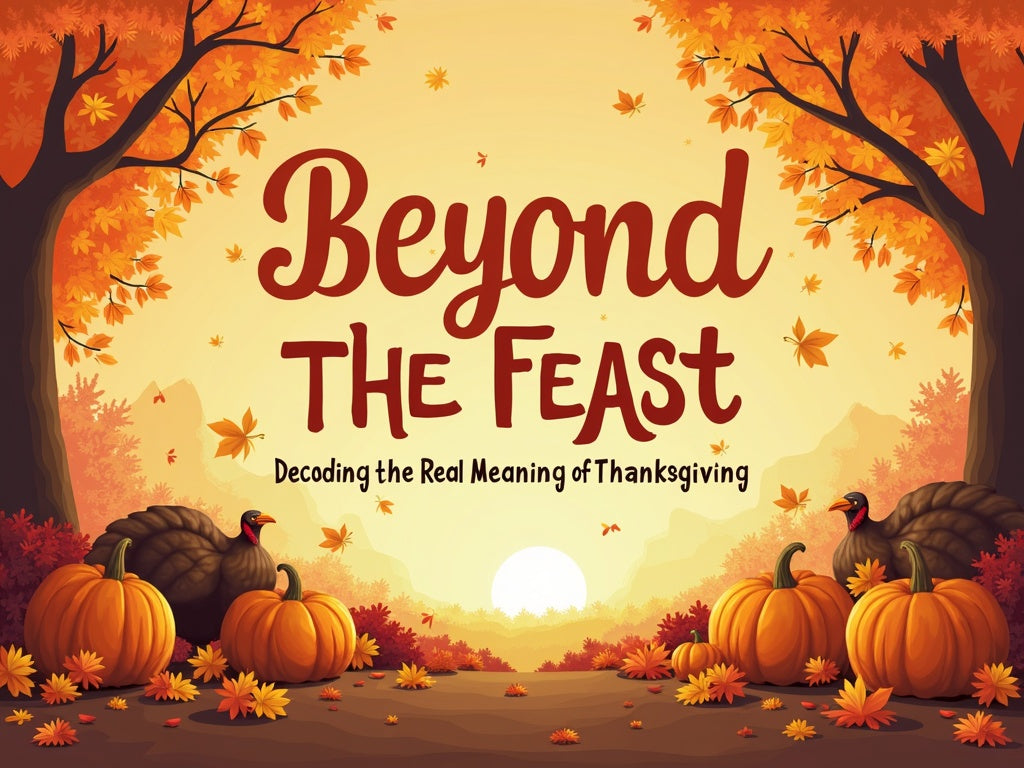Your One-Stop Shop for Everyday Essentials & Unique Finds
Beyond the Feast: Decoding the Real Meaning of Thanksgiving
The aroma of roasting turkey, the warmth of family gathered 'round, the televised parade – Thanksgiving is a sensory explosion. But amidst the festive indulgence, have you ever paused to consider what Thanksgiving really means beyond the feast? Peel back the layers of cranberry sauce and pumpkin pie, and you'll discover a complex history, a poignant reflection on gratitude, and a call to compassion that resonates far beyond a single Thursday in November.
Thanksgiving Origins: What are the Historical Roots of Thanksgiving?
The idea of giving thanks for a bountiful harvest is ancient and universal. Cultures worldwide have celebrated the earth's generosity for millennia. Ancient Greeks honored Demeter, the goddess of agriculture, while the Romans celebrated Ceres. In the Jewish tradition, Sukkot is a harvest festival giving thanks for the bounty of the land. These celebrations often involved feasting, rituals, and expressions of gratitude for the sustenance that allowed communities to survive. Thanksgiving, as we know it in America, however, carries a more specific and contested history.
The Pilgrims and the First Thanksgiving: Who Were They, and What Actually Happened?
In 1620, a group of English Separatists, later known as Pilgrims, arrived in what is now Massachusetts aboard the Mayflower. Facing a harsh winter and unfamiliar conditions, they suffered immense hardship. Nearly half of the original 102 passengers perished. The following autumn, after a successful harvest aided by the knowledge and assistance of the local Wampanoag tribe, the Pilgrims held a three-day feast. This event, documented in accounts from the time, is widely considered the first Thanksgiving. However, it’s crucial to understand this event within a larger historical context. The Pilgrims' arrival marked the beginning of colonization, which would have devastating consequences for Native American populations.
Native American Perspective: How Do Native Americans View Thanksgiving? What is the Other Side of the Story?
For many Native Americans, Thanksgiving is not a celebration, but a reminder of the genocide, dispossession, and cultural destruction inflicted upon their ancestors by European colonists. The narrative of peaceful coexistence often overshadows the subsequent conflicts, broken treaties, and forced assimilation that followed the first Thanksgiving. Understanding this perspective is crucial for a complete and honest understanding of the holiday. The National Day of Mourning, observed by many Native Americans on Thanksgiving Day, serves as a powerful counter-narrative, honoring ancestors and raising awareness about the ongoing struggles for indigenous rights and sovereignty.
Thanksgiving as a National Holiday: When Did Thanksgiving Become a National Holiday, and Why?
While Thanksgiving-like celebrations occurred sporadically throughout American history, it wasn't until 1863, in the midst of the Civil War, that President Abraham Lincoln officially proclaimed Thanksgiving a national holiday. He hoped that a day dedicated to gratitude could help unify a deeply divided nation. Sarah Josepha Hale, a magazine editor, had tirelessly campaigned for a national Thanksgiving holiday for decades, believing it could foster a sense of national identity and shared purpose. Congress later established the fourth Thursday of November as the official date.
The Meaning of Gratitude: How Does Thanksgiving Connect to the Broader Concept of Gratitude?
At its core, Thanksgiving is an invitation to practice gratitude. Recognizing and appreciating the good things in our lives – our health, our relationships, our opportunities – has been scientifically linked to increased happiness, resilience, and overall well-being. Thanksgiving provides a dedicated time to reflect on our blessings, fostering a sense of contentment and perspective. It encourages us to shift our focus from what we lack to what we have, cultivating a more positive and appreciative outlook.
Thanksgiving Traditions: Beyond the Turkey, What are the Common Traditions and Their Origins?
Many Thanksgiving traditions are a blend of historical influences and evolving cultural practices. The centerpiece, of course, is the turkey, which became associated with Thanksgiving in the late 19th century as readily available and large enough to feed a crowd. Other common dishes, like cranberry sauce and pumpkin pie, have roots in colonial cooking, adapted to use available ingredients. The Macy's Thanksgiving Day Parade, a beloved spectacle, began in 1924 as a way for Macy's employees to celebrate the start of the Christmas shopping season. Watching football games on Thanksgiving has also become a deeply ingrained tradition, offering entertainment and a shared experience for families and friends.
Modern Thanksgiving: How Has Thanksgiving Evolved in Modern Society?
In today’s fast-paced world, Thanksgiving continues to evolve. While family gatherings and traditional meals remain central, many people are finding new ways to celebrate. Friends giving, potluck-style gatherings with friends, have become increasingly popular, offering an alternative for those who cannot be with family or who simply prefer a more casual setting. Concerns about ethical eating and sustainable agriculture have also led to a growing interest in sourcing locally grown ingredients and opting for humanely raised turkeys. The Black Friday shopping phenomenon, which often overshadows the spirit of gratitude, has also sparked debate about the commercialization of the holiday.
Giving Back During Thanksgiving: How Can We Make Thanksgiving More Meaningful Through Acts of Service and Charity?
One of the most meaningful ways to celebrate Thanksgiving is to extend our gratitude to others through acts of service and charity. Volunteering at a food bank, donating to a homeless shelter, or simply offering a helping hand to a neighbor in need can transform Thanksgiving from a purely self-focused celebration into an opportunity to make a positive impact on our communities. By sharing our blessings with those less fortunate, we embody the true spirit of Thanksgiving and create a more inclusive and compassionate holiday for all.
Thanksgiving Around the World: Are There Similar Harvest Festivals in Other Cultures?
The impulse to celebrate the harvest and express gratitude for nature's bounty is a universal human experience. Many cultures around the world have their own versions of Thanksgiving. In Germany, Erntedankfest is a harvest festival celebrated in the autumn with church services, parades, and traditional meals. Chuseok, a major harvest festival in Korea, involves family gatherings, traditional foods, and honoring ancestors. In West Africa, the Yam Festival is a celebration of the yam harvest, often involving music, dance, and ceremonial offerings. These diverse celebrations highlight the shared human connection to the land and the importance of giving thanks for the gifts of nature.
Reflecting on Thankfulness Year-Round: How Can We Cultivate Gratitude Beyond Thanksgiving Day?
While Thanksgiving provides a dedicated time for reflection and appreciation, the practice of gratitude should extend far beyond a single day. Cultivating a daily gratitude practice – whether through journaling, meditation, or simply taking a few moments each day to acknowledge the good things in our lives – can have a profound impact on our overall well-being. By making gratitude a regular part of our lives, we can foster a more positive mindset, strengthen our relationships, and appreciate the beauty and wonder that surrounds us every day. Thanksgiving may be a starting point, but the journey of gratitude is a lifelong pursuit.














Leave a comment